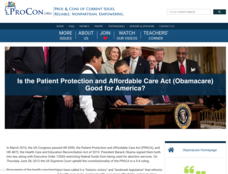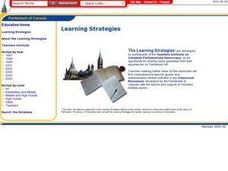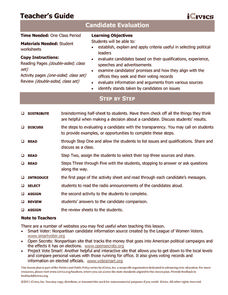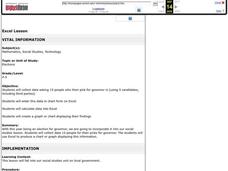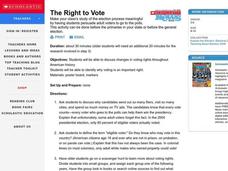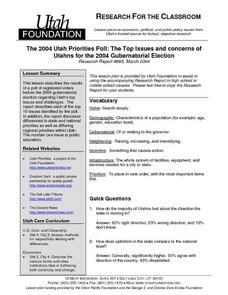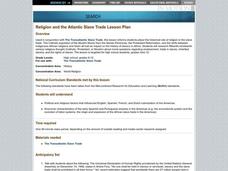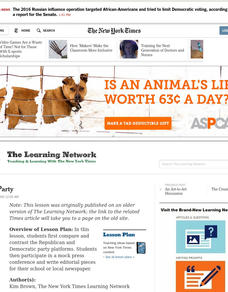iCivics
Win the White House
Here is a unique and engaging approach to learning about the steps a presidential candidate must take during a campaign. Learners role play the part of a candidate in this online interactive, taking part in a presidential...
ProCon
Obamacare
Former President Barack Obama reformed the United States' health care system with Obamacare, but is the new legislation good for America? Scholars read a historical timeline about the passage of health care reform laws and compare United...
Curated OER
"Last Man Standing" Lesson Plan: What Do People Want from Politicians?:
Students evaluate various methods of sampling opinions, consider the role of polling in elections, and consider the role of media reporting in the outcome of elections. They gain skills they can use to analyze and evaluate media...
Curated OER
Exercising the Franchise! The Right to Vote
Students research Canadian election procedures, identify candidates and corresponding political platforms for current elections and hold mock elections. They develop a written report about a specific political party.
Curated OER
Exploring Historical and Current Leaders of Canada
Students research Canadian political figures and then do a presentation about them.
Curated OER
The Class Party
Young scholars take a closer look at presidential elections. In this Electoral College lesson, students participate in a classroom simulation that requires them to form a political party that puts forth a candidate to run for election.
iCivics
Candidate Evaluation
How can we decide between candidates on election day? After contemplating various issues and qualities, your learners will go through a step-by-step process of researching and evaluating sample candidates and determining their...
Curated OER
Excel Lesson
Young scholars explore data and Excel spreadsheets. They collect data about political candidates. Students enter the data into a chart on Excel. They create a graph using the data and Excel.
Curated OER
Election 2005: Campaign Issues
Students take a closer look at the election of 2005. In this British politics lesson, students listen to a lecture about the 2005 campaign and active citizenship. Students then create collages and news boards about the...
Curated OER
The Right to Vote
For this voting worksheet, students identify and discuss changes in voting rights throughout American history.
Then, they identify why voting is an important right for Americans. Finally, students create voting bookmarks instead of or in...
Curated OER
Reviewing the Election Process by NOW Classroom for PBS
Students take a closer look at presidential elections. In this election process lesson, students discuss the roles of the primary, caucus, polls, Electoral College, delegates, and lobbyists in the process. Students then access the listed...
Curated OER
Campaign! The Election Simulation Game
Students simulate the election process with one group acting as politicians and others acting as the constituency with concerns specific to their assigned area of the country. They give speeches, take polls, and elect a leader based on...
Curated OER
Zimbabwe
Students explore the hardships being faced by the people in Zimbabwe. In this World History lesson, students research the challenges of Zimbabwe, such as hunger, poverty, low life expectancy and political controversy. Upon...
Curated OER
What Do We Owe To Thoreau?
Students use this design as an electronic reading and writing guide to Henry David Thoreau's famous essay, "On Civil Disobedience." They use activities to familiarize students with the political issues of Thoreau's time. Comprehension...
Teaching Tolerance
The True History of Voting Rights
Explore what voting rights really are in an intriguing instructional activity that explores the history of American voting. The resource examines the timeline of voting rights in the United States with group discussions,...
Curated OER
The President's Day Has Arrived
Students state and defend their opinions regarding all aspects of the impeachment proceedings against President Clinton after completing a survey and researching the topic. They also consider opinion polls, media bias and global politics.
Curated OER
The 2004 Utah Priorities Poll
Students participate in a lesson that focuses on a state survey for Utah. The survey is intended to find the public opinion of how the state is doing in the public eye. They analyze the survey and create their own to research the status...
Curated OER
RELIGION AND THE ATLANTIC SLAVE TRADE
High schoolers examine the political and religious factors that influenced English, Spanish, French, and Dutch colonization of the Americas, and the economic characteristics of the early Spanish and Portuguese empires in the Americas.
Curated OER
What Difference Does A Name Make?
Students view the film The Persuaders that discuss the perspective and spin of language use for a variety of issues. They discuss the career of Frank Luntz, a man that runs focus groups to determine how to advantageously phrase issues in...
Curated OER
Designing Samples/Simple Random Samples
Students explore the concept of sampling techniques. In this sampling techniques lesson, students identify possible sources of bias in situations such as phone polls, supermarket surveys, and drawing names from a phone book. Students...
Curated OER
It's My Party
Students compare/contrast the Republican and Democratic platforms using Venn diagrams, then read and discuss, "The Conventions Are Over. The Party's Just Starting." students then participate in a mock press conference and write editorial...
Curated OER
Democracy: Understanding the Canadian Parliamentary System
Students study democracy, levels of Canadian government and the responsibilities of elected officials. They write letter's to the Prime Minister about their pride in Canada.
Curated OER
Priorities and Power: Migrants and Voting
Students examine the African-American migrants entry into the political process. They summarize their findings in a short essay.
Curated OER
So, You Think You Understand Parliamentary Democracy ?
Tenth graders experience first hand the complexity of the political process. They analyze the relationship between party policies and the political spectrum and develop an understanding of how Canada's laws are debated and passed.



